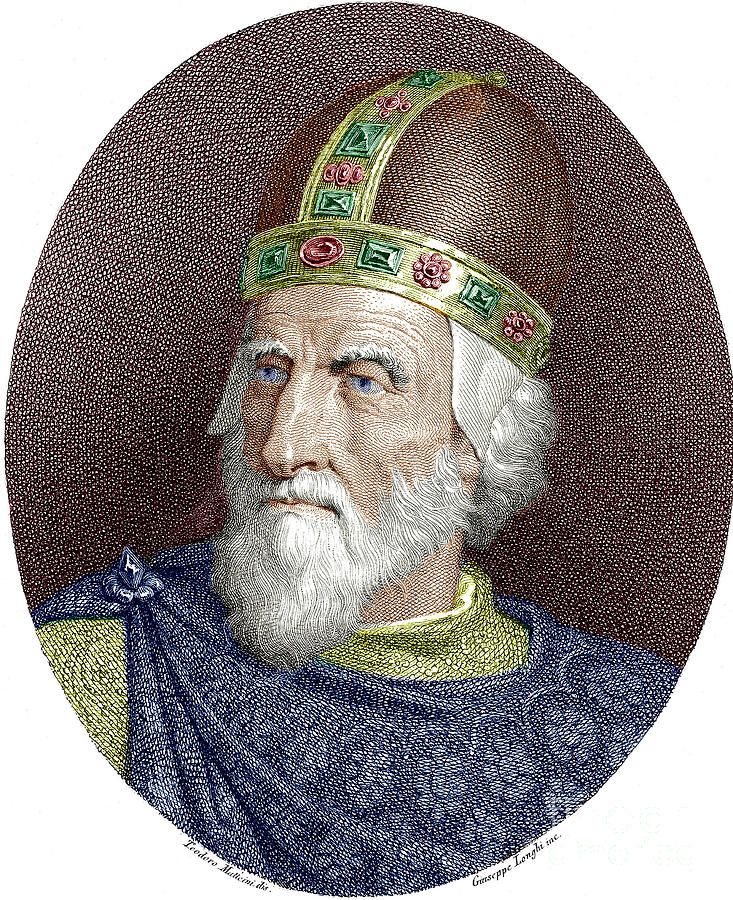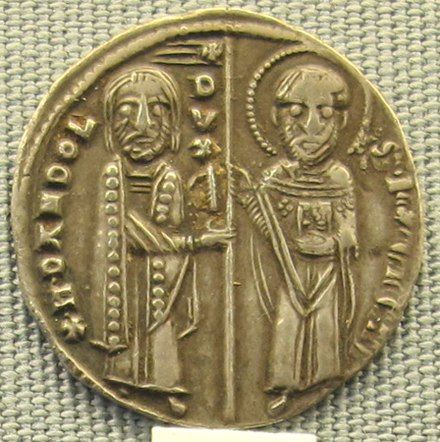For those of you who want to start at the beginning of the series, click here.
Today we're gonna be talking about the world's most terrifying blind man, the 34th Rule of Acquisition, and the high price of founding an empire that doge Enrico Dandalo paid to take Venice to the next level. That price was human life, and a literal ton of art-theft.
Zooming Out: The Fourth Crusade
For the big picture of the fourth crusade in 100 words or less, it's hard to do better than HG Wells in his OUTLINE OF HISTORY:
“The bulk of the Fourth Crusade never reached the Holy Land at all. It started from Venice (1202), captured Zara, encamped at Constantinople (1203) and finally in 1204 stormed the city. It was frankly a combined attack on the Byzantine Empire. Venice took much of the coast and islands of the empire, and a Latin, Baldwin of Flanders, was set up as emperor in Constantinople. The Latin and Greek Churches were declared to be reunited and the Latin emperors ruled as conquerors in Constantinople from 1204 to 1261.”
This is all the treatment that Wells gives the fourth crusade. But there are some things I'd like to mention--things that lend weight to the story of Venice's ascension to empire. This is not going to be an exhaustive list or account of the crusade--there are an embarrassing amount of sources on this event, and any history of Venice will spend a good deal of time on it. Still there were things I couldn't into the video I think are worth mentioning.

Venice is Always Looking Out For Her Own Interests
When accepting the contract to build a fleet for the Franks, the Venetians very likely were playing a double game. The crusade they had just agreed to provide with ships and men would be invading Egypt--a lucrative trading partner of Venice, particularly in cotton.
It would be insane to jeopardize such a rich trade route over a silly thing like a pope-sponsored holy war--the route with Egypt was also a hedge against the economic pain of excommunications, which prohibited Christian cities from trading with Venice (Venice has a long history of being excommunicated and being let back into the fold. They might as well have had a punch card.) From the get-go, the Venetians were playing a very different game from the Franks.

To summarize the situation, I turn to JJ Norwich's History of Venice:
“Geoffrey [the Frankish emissary] notes in passing that the agreement withheld all mention of Egypt as the immediate objective. He gives no explanation; he and his colleagues were probably afraid—and with good reason, as it turned out—that the news would be unpopular with the rank and file., for whom Jerusalem was the only legitimate goal for a Crusade and who would see no reason to wast time anywhere else…the Venetians, for their part, would have been only too happy to cooperate in the deception, for they had another secret of their own; at the very moment that the were being concluded, their own ambassadors were in Cairo discussing a highly profitable trade agreement with the Sultan’s Viceroy, to whom, shortly afterwards they almost certainly gave a categorical assurance that Venice had no intention of being party to any attack on Egyptian territory…this allegation cannot be conclusively proved. There is no treaty extant, and though evidence for one is strong there is also a problem of its accurate dating. But most modern historians are convinced and there would be nothing uncharacteristic in such double-dealing by Venetians at this time.”
Venice, in short, was moved by profits, not prophets--no matter what religious theatrics Enrico Dandalo might have skillfully used to convince the Franks he truly intended to deliver them in Egypt.
The brutal sacking of Zara--and then Constantinople--take on a different cast once one considers that they were conducted for profit, but also likely to defend an existing source of Venetian revenue.
The Sacking(s) of Constantinople

“Probably no other city in history ever offered plunder like that found by the crusaders when they sacked the capital of Byzantium in 1204. According to the estimate of the Byzantines themselves, Constantinople held fully two thirds of the world’s wealth. And it was the Venetians who shrewdly garnered the lion’s share.”
Colin Thubron summarizes just how rich Constantinople was in the above quote. The capital of the Byzantine empire was simultaneously that era's equivalent to Fort Knox, the Louvre and the Vatican all rolled up into one city.
Constantinople was sacked twice by the Venetians and Franks. Sacked of course being the polite term for 'rape, pillage and burn' that was historically a major motivator for going on any sort of military venture.
Choniates a primary source and eye-witness to the slaughter, writes in his Histories, on the Frankish and Venetian sacking of Constantinople:
“I do not know how to put any order into my account, nor where to begin, continue or end the story of what those monsters committed. They broke the holy images, beloved of the faithful. They hurled the sacred relics of the martyrs into unmentionable places. They scattered the body and blood of the Savior. These precursors of Antichrist seized the chalices and patens, tore out their precious stones and ornaments, and drank from them.”
Thubron goes onto summarize Choniate's account in describing the common crimes committed in the sack of Constantinople:
“The soldier burst into the convents, raped the nuns and stabbed those who resisted. They rifled even the tombs of the Emperors. In the magnificent 6th century church of Hagia Sophia, the Vatican of Eastern Christendom, they slashed to bits the great silver altar screen and stripped the precious metals from the furniture and doors.
Trains of mules and horses were led into the church to carry away its treasure, and when some of the beasts slipped under their plundered burdens, they were slaughtered where they lay, covering the marble floors with blood and excrement. On the throne of the Patriarch—head of all Eastern Christendom—lolled a drunken prostitute who sang bawdy songs; she then danced obscenely around the church."
However, even in committing crimes, the Venetians stood apart from the Franks. Colin Thubron goes on to make extensive notes on what the Venetians chose to take as opposed to the more indiscriminate pillaging of the Franks:
“The Venetians, more sophisticated than their allies, concentrated on items of artistic merit. Their greatest prize was four bronze horses—among the few pieces of classical statuary not smashed by the mob or melted down for the price of the metal—that were taken from Constantinople’s Hippodrome and placed atop the facade of St. Mark’s Basilica in Venice. Anything else that could conceivably be used to embellish the basilica was also looted columns, capitals and slabs of marble, enamels, icons, plates and chalices. And a host of reliquaries, ivories, mosaics and illuminated manuscripts found their way back to St. Mark’s.”

There were, of course, some moments of truly dark comedy in the sack. This is the last Thubron quote, I swear:
“Two heads of John the Baptist were produced (Venice got a tooth) and the Bishop of Soissons returned home with the finger that Doubting Thomas was said to have thrust into the side of Christ. Others divided the corpses of the Apostles, splinters of the true Cross, vials of holy blood and portions of anatomies of most of the lesser saints.”

All this stolen art--and religious relics--has a growth effect on Venetian claims towards legitimacy. Not to mention the fact that the Venetians had managed the remarkable feat of managing to backstab and acquire a significant fraction of the Byzantine Empire.
The Venetians could now claim legitimacy from the Roman Empire itself--they'd conquered them, afterall, and taken its greatest treasures. Which brings me to my next point.
Dandalo as a Leader

Enrico (anglicized to Henry, which is rather less intimidating) Dandalo was a formidable and shrewd leader. On this, even the sources that loath him, agree. In contrast to the last doge(s) we discussed, the Antenori brothers, Dandalo kept the main values and profit of the growing Venetian republic firmly in view at all times. While this sounds good and noble--the rise of the Venetian empire was bought with broken promises, a sea of blood and the fall of the Byzantine empire. The human cost alone is staggering.
The old doge avoided many traps and snares that came in the conquest of Constantinople--too many to name at each turn. The two big ones were not the physical danger he routinely placed himself in (even, in one case, shaming his men by sending his ship first into battle), but of a political nature.
After seeing the disaster that Alexius had been as emperor and defeating Mourtzouphlos, the Venetians realized that they couldn't leave Constantinople in the hands of the Byzantines. So they decided that it would be better to have the Franks--confusingly changed to the term 'Latins' take over the shop instead. So, in a show of fairness--read, tilting things their way--the Venetians proposed that the Franks vote on the new emperor of the Latin empire from among their number.
Just one problem. The head of the Franks, Boniface, while in every other respect completely unobjectionable to Venetian interests, was favored by the Genoans. Those damn shifty competitive Genoans.
Clearly, it would be catastrophic for Venice if a friend of Genoa was put in charge of some of the most profitable trade routes in their newly acquired empire.
Doge Enrico Dandalo didn't make threats or bluster, though he was fond of doing both. Instead, he showed tact--offering to host the deliberations from his quarters in Constantinople and thereby acting as a neutral arbiter while doing all he could behind the scenes to get someone other than Boniface elected emperor.
Spoiler alert: He succeeded. Baldwin of Flanders, friend of Venice, was elected the first emperor of the Latins.

I'll let JJ Norwich summarize the second trap the Dandolo avoided in the fourth crusade:
"...his diplomatic skill had shaped a treaty which gave Venice more than she had dared to hope and laid the foundations for her commercial Empire. Refusing the Byzantine crown for himself--to accept it would have created insuperable constitutional problems at home and might well have destroyed the Republic...finally, while encouraging the Franks to feudalize the empire--a step which could not fail to create fragmentation and disunity and would prevent its ever becoming strong enough to obstruct Venetian expansion--he had kept Venice outside the feudal framework, holding her new dominions not as an imperial fief but by her own right of conquest."
The Antenori, in Dandalo's place, wouldn't have even waited for the blood to dry on the walls before declaring themselves emperors. But the idea of loyalty to the letter and emerging (limited, oligarchic) spirit of the Venetian republic clearly was gaining a serious hold in the position of the doge. Doge Enrico Dandalo had avoided the temptations of dictatorship and acted in the (financial and geopolitical) best interests of the Venetian Republic over personal enrichment and aggrandizement. Better yet, he had done all this in such a way that the Latins took all the risk of establishing an empire in a hostile foreign land, while Venice rose to empire herself and gained a tremendous boost in financial power and political clout.
That brings us to the end of this particular part of Venetian history. Join us next week!
For a discussion on bats, plagues, the second Jewish ghetto in Europe and Venetian inferiority complexes, go to the talk back link here:
https://www.facebook.com/Sewerratsproductions/videos/294061758768457/
